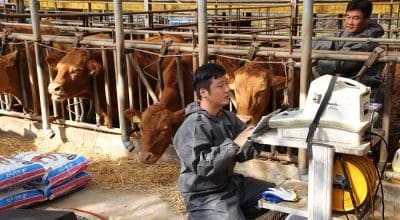South Korea has been rocked by another Lumpy Skin Disease outbreak – the fourth reported this year – despite completing a national vaccination program of cattle last November.
LSD is a serious disease of cattle and water buffalo that is mainly spread by biting insects including flies, mosquitos and midges, as well as by ticks. It has never occurred in Australia but is an emerging threat as it continues to spread through Asia.

Hanwoo cattle on feed in South Korea – image: Cargill
Before 2012, the distribution of LSD had been limited to Africa and Israel. Since then, LSD has spread to many parts of the Middle East, southeast Europe, the Balkans, the Caucuses, the Russian Federation and Kazakhstan. Since 2019, LSD has spread throughout Asia, detected in nearby Indonesia for the first time in March 2022. LSD has since been detected in a number of Indonesia’s provinces.
The Korean Agriculture Ministry reported the latest outbreak on Wednesday. The case was confirmed in a herd of 116 breeding cows at a livestock farm in Yeoju, southeast of Seoul, according to the Ministry.
It is the fourth LSD case confirmed in South Korea this year, following the first detection at a livestock farm in Anseong, near Seoul, back in August last year.
To prevent further infections, the government has cordoned off the latest affected farm and implemented quarantine measures, the ministry said. The infected herd will be culled in accordance with relevant guidelines.
Last November South Korea’s agriculture ministry said it had completed a nationwide campaign to vaccinate all cattle against LSD, two months after the country reported its first-ever infection.
Some 4.05 million South Korean cattle were vaccinated to protect them against LSD, however authorities at the time warned the industry to remain vigilant, as it would take three weeks for vaccinated cattle to develop antibodies.
The country has now confirmed around 100 cases nationwide, local news reports said.
